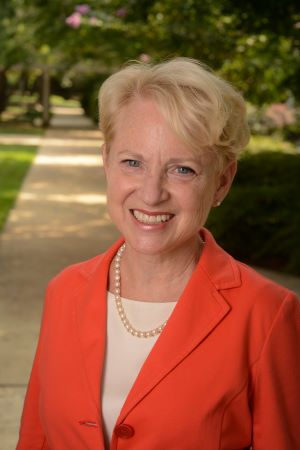
Laurie O. Robinson is the Clarence J. Robinson Professor of Criminology, Law and Society at Mason and a two-time former U.S. assistant attorney general who served in both the Clinton and Obama administrations. Photo by Evan Cantwell/Creative Services.
It’s been six years since the death of Michael Brown at the hands of police in Ferguson, Missouri, and America is once again embroiled in large-scale civil unrest amidst heated conversations about police brutality and equal justice under the law.
It’s an ugly scenario that Laurie O. Robinson hoped would not play out again after President Barack Obama selected her to co-chair the White House Task Force on 21st Century Policing in 2014, but she remains confident that needed changes are coming.
“We could never have imagined that these issues would still be so front and center as they are today,” said Robinson, the Clarence J. Robinson Professor of Criminology, Law and Society at Mason and a two-time former U.S. assistant attorney general who served in both the Clinton and Obama administrations.
Like many Americans, Robinson was distraught over the video showing George Floyd’s death in May at the hands of a Minneapolis police officer. She cautioned, however, against inferring that no progress had been made toward police reform since Ferguson.
“Things really have changed following Ferguson because police agencies and police leaders in particular really did have a wake-up call after Ferguson,” said Robinson, who has been involved in national criminal justice policy for more than three decades. “We’ve seen changes in police agencies across the country in those six years. But clearly it’s not been enough and more change is needed.”
In the wake of Brown’s death, the task force that Robinson co-chaired with former Philadelphia and Washington, D.C., police chief Charles Ramsey produced 59 recommendations, ranging from immediately implementable ideas such as the codifying of use-of-force policies and the collection of data on police shootings to bigger-picture changes that touched on diversifying police forces and eliminating the “warrior” mindset now prevalent throughout many law enforcement agencies.
It was a significant breakthrough that has since led 34 states and Washington, D.C., to pass police reform legislation that dealt with use-of-force and racial bias policies among other things. Twenty-seven states have passed laws since Brown’s death requiring mandatory training for officers when dealing with citizens with mental health issues.
“This report has had amazing staying power in the field,” Robinson said. “It has had tremendous penetration in the policing field. It would be hard to find a police chief in this country who isn’t familiar with the report.”
But emotions remain high in the wake of more highly publicized deaths of African Americans at the hands of police.
Larger scale and more visible changes to police policies have been slow to take root for a number of reasons, Robinson said, primarily because of the de-centralized nature of American law enforcement and an ingrained police culture resistant to change.
Unlike the centralized police systems in Europe, Robinson explained, America has more than 18,000 state and local law enforcement agencies, with roughly half of those departments consisting of 10 officers or fewer. Only a very small number of those departments receive direct federal funding, so the federal government has little leverage with them in terms of enacting policy change.
Public attention is typically fickle, but Robinson is hopeful this time will be different in the wake of the extended protests and discontent that have gripped the nation in the wake of the deaths of Floyd, Breonna Taylor and Rayshard Brooks. Americans of all ages, colors, ethnicity and class have come together in support of police reform, and their robust collective efforts continue to amass political steam, as well as several key corporate allies, she said.
“I do think we will see change,” Robinson said.
In the meantime, Robinson, who also serves as the chair of the board of directors of the Council on Criminal Justice, hopes to see more ongoing dialogue and engagement between the nation’s law enforcement agencies and the communities they’ve sworn to protect.
That starts, she said, with recruiting more faces that better represent the communities they serve.
“Focusing on who we’re bringing into policing is a really critical issue,” Robinson said.
Listen to Robinson’s interview on the “Access to Excellence” podcast.
